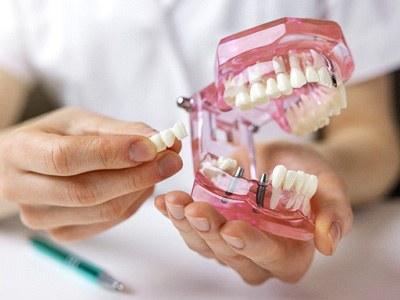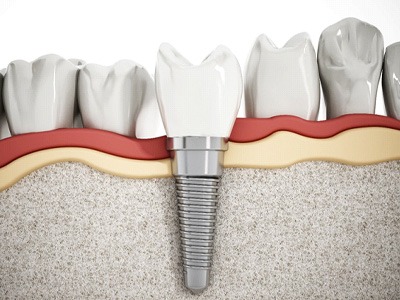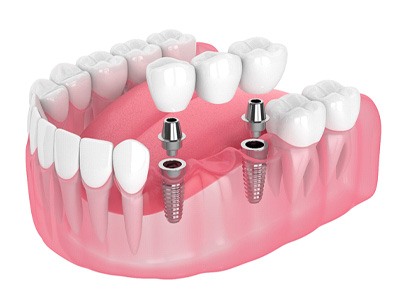Dental Implants – Rochester, MN
Restore Your
Entire Smile

Have you lost one or more teeth? This can be a devastating experience for both your oral health and your quality of life. Even worse, doing nothing about it can lead to jawbone deterioration, higher risk of infection, and additional tooth loss over time. If you’re ready to complete your smile, Dr. Nicholas Brong has the solution you need with dental implants in our Rochester, MN dental office. Our team at Zumbro Family Dental offers multiple options to fill the empty spaces.
Why Choose Zumbro Family Dental for Dental Implants?
- Partnered with Local Implant Specialists
- Judgment-Free Environment
- State of the Art Dental Technology
What are Dental Implants?

Dental implants can be considered artificial tooth roots. While other tooth replacements are only concerned with filling in the empty space above your gums to recomplete your visible smile, dental implants go a step further and join directly with the jawbone. Needless to say, prosthetic teeth that are anchored to the mouth via surgically placed dental implants will be much more stable and provide greater chewing power than those that just sit on the gums or other teeth.
The 4-Step Dental Implant Process

The dental implant process isn’t exactly the same for everyone, but it can typically be divided into four steps: consultation and preliminary procedures, placement surgery, osseointegration and abutment, and then restoration. At every stage, you can turn to Dr. Brong and the rest of our team for answers to your questions and guidance. We can let you know what you can expect next and help you on the path to a complete smile.
Initial Dental Implant Consultation

The first step is the dental implant consultation where we examine your mouth to determine how many teeth are missing and whether you’re healthy enough for the procedure. As long as your mouth doesn’t have any sign of infection, and you have enough jawbone density, you likely qualify. Some preliminary work like bone grafting or gum disease treatment may have to be done before moving on to the next step.
Dental Implant Surgery

The second step is dental implant surgery. A trusted implant specialist will insert one or more implant posts in your jaw in carefully chosen areas. Although this procedure is considered minor, it is still surgery, which is why we only work with the most experienced local experts to ensure success and comfort.
Dental Implant Osseointegration & Abutment

The secret to dental implants’ stability and security is that they become embedded in the jawbone, but this process takes some time. After a few months of waiting for osseointegration (the process of the bone joining with the implant) to complete, you can move onto the next phase, which is when abutments are attached to the implant posts.
Delivery of Dental Implant Restoration(s)

When the gum tissue has healed around the abutments, we will then take impressions of your upper and lower arches. Our dental lab will take a few weeks to produce custom restorations that look and feel just like real teeth. Once they are finished, you’ll return to our dental office for the final step, which is designing and placing the final restoration.
Benefits of Dental Implants

The secret behind the success of dental implants is the fact that they replace both the root and crown of your tooth. Traditional solutions only replace the crown. While this does restore some oral functions, the lack of a root will still cause the jawbone to deteriorate. Dental implants are the only available treatment to replicate the full structure of the tooth to protect your bone density. Due to this unique process, dental implants offer exceptional benefits that are not possible with conventional treatments.
Day-to-Day Benefits

- Simple Dental Care: Traditional restorative dental treatments like bridges and dentures typically require certain cleaning tools and techniques to maintain them. With dental implants, you’ll simply need to brush, floss, and rinse them with mouthwash every day (as well as visit your dentist biannually) to make the most of them.
- Enhanced Bite: Dental implants can help you regain 80% or more of your natural biting power, meaning you’ll be free to enjoy all of your favorite foods without having to worry about your brand-new pearly whites shifting out of place when chewing.
- Increased Confidence: Since you’ll be free to eat, speak, and laugh more naturally and comfortably with your dental implants, you should experience improved confidence and self-esteem in the long run. Not only will this make you smile more often, but it’ll also help boost your immune system from the simple act of grinning frequently.
Health Benefits

- Preserve the Jawbone: Without tooth roots, your jawbone can begin to deteriorate or shrink over time. This can even cause your other remaining natural teeth to move out of place or potentially come out as well. By embedding dental implants into the jawbone, you can end up stimulating circulation and proper bone growth, allowing you to preserve your jaw and avoid further tooth loss.
- Improved Oral Health: If you’re missing teeth, then you might be at an increased risk of developing oral health problems such as gum disease, additional tooth loss, and misalignment. With dental implants, you can regain your bite and significantly lower your chances of these complications in the future.
- Greater Overall Well-Being: The healthier your smile is, the lower your risk of developing serious general health problems, including diabetes and heart disease. By replacing your missing teeth with dental implants, you can minimize oral health issues while effectively promoting a better quality of life.
Long-Term Benefits

- Cost-Effective Treatment: Other restorative dental services, such as dentures and bridges, typically have a lower upfront value while needing replacements every 10 years or so. Dental implants, however, won’t require as many replacements or need special products to maintain them, saving you more in the long term.
- Long-Lasting Results: While dental bridges and dentures last about 10 years before needing replacements, dental implants can go for several decades to a lifetime with regular cleaning and routine dental checkups with your dentist.
Who Dental Implants Can Help
You’re a candidate for dental implants if you have a healthy mouth, a jaw containing enough bone tissue to support the posts and are willing to commit to optimal oral hygiene habits to protect your investment over the long term. It doesn’t matter if you’re missing one tooth or all of your teeth; as long as you’re considered a viable candidate for the procedure, you can completely restore your smile with dental implants with the following treatments:
Missing Single Tooth

A single tooth can be replaced using an implant post, an abutment, and a crown. The implant post is surgically placed into your jawbone. After it has fused to the post, an abutment is placed on it. This is a connector piece to allow a dental crown to be attached.
Missing Multiple Teeth

To bridge the gap between several missing teeth, dental implants can be used to anchor your prosthetic teeth in place. As an alternative to a traditional bridge, crowns are not needed. Instead, 1 to 2 implant posts are used to hold it in place.
Missing All of Your Teeth

If traditional dentures have failed to work for you in the past, you can enjoy the stability of dental implants. An average of 4 implant posts are used to anchor your denture in place. You can chew, speak, and smile with confidence.
Learn More About Implant Dentures
Understanding the Cost of Dental Implants

It’s difficult to say for sure how much you can expect to pay for dental implants since there are so many variables to take into account. The cost in your particular case may not be the same as another patient’s. Our team is here to make sure that you fully understand what you can expect when it comes to the final price of your dental implants as well as your options for payment.
Preliminary Treatments & Dental Implant Surgery

You may need to have bone grafting or another type of preliminary procedure completed before you can receive dental implants. Preliminary treatments do increase the total amount that you end up paying, but they are necessary if you want your new smile to last.
The surgery to place the dental implants in your jaw comes with its own price tag. This part of the dental implant process is handled by an outside specialist; they will let you know how much the procedure will likely cost.
The Parts of Your Dental Implant

Determining the price of the dental implants themselves depends on a number of factors:
- How many dental implants are needed? Procedures that involve multiple implant posts tend to cost more than those where only a single post is placed.
- What kind of restoration will be used? Dental implants can support crowns, bridges, and dentures. The smaller restorations tend to cost less.
- What brand of dental implant will be used? There are multiple manufacturers to choose from, each of which makes their dental implants in a different way to meet a variety of needs.
How Dental Implants Can Save You Money

One thing to note about dental implants is that they often last much longer than traditional bridges and dentures. A properly cared-for dental implant can easily stay in the mouth for decades. Because dental implants don’t need to be replaced as often as other forms of tooth replacement, they can ultimately be the better choice for your bank account in the long run.
Does My Dental Insurance Cover Dental Implants?

You should check your dental insurance policy carefully to see what sort of coverage is available for dental implants. A lot of plans may not pay for the implant posts but may still provide coverage for the final restoration or related preliminary treatments. Remember that you can always call your dental insurance company if you have any questions about your benefits.
Making Dental Implants Affordable

Dental insurance is just one possible way to manage the cost of replacing your missing teeth with dental implants. There is also the option of third-party financing via CareCredit. You can choose a monthly payment plan that suits your budget. Once a plan has been chosen, you will be able to pay for your treatment in installments that come with little to no interest.
Dental Implant Failure & Salvage

Dental implants can fail for a variety of reasons, and the solution depends on the circumstances. Sometimes it might be possible to fix the problem without taking the dental implants out, but in other cases, the posts might have to be removed (although they can sometimes be replaced later). It’s recommended that you call our office immediately if a dental implant fails so that we can start discussing the best next steps you can take.
Learn More About Dental Implant Failure & Salvage
Maintaining & Caring for Your Dental Implants

You can enjoy your new dental implants for the rest of your life. However, it’s important that you are properly caring for them. If you aren’t protecting your implants from damage and infection, you are at increased risk of a dental implant failure. Here are a few simple precautions and lifestyle habits that you can implement to help you enjoy your new smile for many years down the road!
Make Oral Hygiene a Priority

Dental implants don’t get cavities, but it is still important to keep up an excellent dental hygiene routine. Your surrounding teeth can still get cavities, and oral health issues, like gum disease, can cause your dental implant to fail. Remember to brush twice and floss every day. It’s also a good idea to rinse with an antibacterial mouthwash to keep your smile fresh.
Eat a Healthy Diet

When you have dental implants, you don’t need to worry about eating restrictions. This means that you can enjoy a full, nutritious diet! However, overindulging in hard, sticky, or sugary foods can be problematic. Eat plenty of foods with calcium and vitamin C to keep your jawbone strong and your gum tissue healthy.
Break Bad Habits

Bad habits can increase your risk of breaking or failing. Refrain from smoking or chewing tobacco products. This can slow down healing and encourage infection. Don’t use your teeth as tools or chew on hard objects. Doing this can damage your restoration.
Protect Your Dental Implants

Your dental implants are very strong, but they aren’t completely indestructible. If you participate in contact sports, it’s a good idea to wear a sports mouthguard to protect your dental implants. If you grind your teeth at night, wearing a nightguard is a great way to prevent wear and tear of your implants and natural teeth.
Schedule Regular Dental Checkups

You should attend regular cleanings and checkups every six months. This way, we can monitor your dental implants and keep an eye out for any issues. If there is any cause for concern, we can address problems as early as possible.
Dental Implant FAQs
Does Getting Dental Implants Hurt?
Our team will work closely with a trusted implant specialist to provide you with the best tooth-replacement solution you deserve. During your appointment, your oral surgeon will ensure your mouth is completely numbed with a local anesthetic, that way you don’t have to worry about discomfort. They may also provide you with sedation dentistry to help you stay relaxed throughout the procedure. While you’ll technically remain conscious throughout the process, you may not even remember how your appointment went. After your surgery, you might feel some mild discomfort and soreness for several days. This can be managed with painkillers and a cold compress. If your symptoms worsen within three days, call us for help.
Will I Have to Take Off Work for Dental Implant Surgery?
The majority of patients only need to take off about a day or two when getting dental implants. That said, if your job is more physically demanding, then we’ll ask that you take three to four days off instead. Heavy exercise or intense activity can end up diverting blood away from the surgical site where the blood clot should be forming, delaying your recovery. Since every patient is different, you’ll want to consult your dentist so that they can recommend the best way to prepare for your procedure.
How Long Do Dental Implants Last?
The answer to this will mainly depend on a person’s lifestyle habits and oral health. To make sure that your dental implants last, you’ll need to practice good oral hygiene, such as brushing, flossing, and rinsing with mouthwash every day. Visiting your dentist every six months will also help you maintain a clean mouth and avoid complications like cavities and gum disease. You’ll also want to avoid chewing on particularly hard or sticky things, as they can cause damage to your implants. All in all, with proper care, your dental implants should be able to last several decades to a lifetime!
Can I Get Dental Implants If I’m Diabetic?
As long as you have your condition under control, your chances of having successful dental implants will be about the same as those who are nondiabetic. If you don’t keep your diabetes in check and/or your blood sugar is too high, you can risk delaying your recovery, which will make it more challenging for your implants to fuse with your jawbone. Be sure to consult your endocrinologist or primary care professional so that they can help you get your blood sugar levels in check before moving forward with your treatment.





